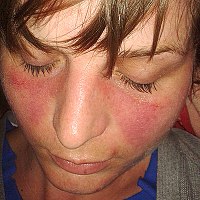
Molecular Analysis Confirms that FKRP‐Related Disorders are Underdiagnosed in Mexican Patients with Neuromuscular Diseases
Sign Up to like & getrecommendations! Published in 2017 at "Neuropediatrics"
DOI: 10.1055/s-0037-1607054
Abstract: &NA; The FKRP ‐related disorders include the limb‐girdle muscular dystrophy type 2I (LGMD2I, MIM#607155) which has a clinical overlap with dystrophinopathies. Except for Brazil, LGMD2I has not been described in other Latin‐American countries, despite that… read more here.
Keywords: fkrp related; molecular analysis; related disorders; mexican patients ... See more keywords

Effects of SPTA1 Gene Variants on the Hematological Phenotype of Mexican Patients with Hereditary Spherocytosis.
Sign Up to like & getrecommendations! Published in 2022 at "Genetic testing and molecular biomarkers"
DOI: 10.1089/gtmb.2021.0264
Abstract: Introduction: Hereditary spherocytosis (HS) is a common hereditary hemolytic anemia characterized by chronic hemolysis, increased indirect serum bilirubin, the presence of reticulocytes and spherocytes in blood smears, and great heterogeneity at the clinical, biochemical, and… read more here.
Keywords: variants hematological; mexican patients; phenotype mexican; hereditary spherocytosis ... See more keywords

Translation, cross‐cultural adaptation and validation of the “Cardiff wound impact schedule,” a wound‐specific quality of life instrument, to the native Spanish of Mexican patients
Sign Up to like & getrecommendations! Published in 2019 at "International Wound Journal"
DOI: 10.1111/iwj.13253
Abstract: The aim of this study was to translate into Mexican Spanish, cross‐culturally adapt and validate the wound‐specific quality of life (QoL) instrument Cardiff wound impact schedule (CWIS) for Mexican patients. This instrument went through the… read more here.
Keywords: instrument; wound specific; specific quality; quality life ... See more keywords

POS0515 FIBROMYALGIA IN MEXICAN PATIENTS WITH RHEUMATOID ARTHRITIS
Sign Up to like & getrecommendations! Published in 2021 at "Annals of the Rheumatic Diseases"
DOI: 10.1136/annrheumdis-2021-eular.1013
Abstract: Rheumatoid Arthritis (RA) is a disabling chronic inflammatory disease that shows an unpredictable and severe clinical course [1]. Global assessment, functional status and disease activity of patients with RA can be influenced also by non-inflammatory… read more here.
Keywords: mexican patients; disease activity; fibromyalgia mexican; disease ... See more keywords

Population pharmacokinetics of mycophenolic acid in Mexican patients with lupus nephritis
Sign Up to like & getrecommendations! Published in 2020 at "Lupus"
DOI: 10.1177/0961203320931567
Abstract: Background Mycophenolic acid (MPA) is an effective oral immunosuppressive drug used to treat lupus nephritis (LN), which exhibits large pharmacokinetic variability. This study aimed to characterize MPA pharmacokinetic behaviour in Mexican LN patients and to… read more here.
Keywords: patients lupus; lupus nephritis; model; mycophenolic acid ... See more keywords

CagL polymorphisms D58/K59 are predominant in Helicobacter pylori strains isolated from Mexican patients with chronic gastritis
Sign Up to like & getrecommendations! Published in 2019 at "Gut Pathogens"
DOI: 10.1186/s13099-019-0286-9
Abstract: BackgroundHelicobacter pylori is a Gram-negative bacterium that colonizes the gastric mucosa in humans. One of the main virulence factors of H. pylori is the cag pathogenicity island (cagPAI), which encodes a type 4-secretion system (T4SS)… read more here.
Keywords: chronic gastritis; cagl polymorphisms; patients chronic; d58 k59 ... See more keywords

Abnormalities in subsets of B and T cells in Mexican patients with inborn errors of propionate metabolism: observations from a single-center case series.
Sign Up to like & getrecommendations! Published in 2021 at "Allergologia et immunopathologia"
DOI: 10.15586/aei.v49i1.27
Abstract: BACKGROUND Propionate inborn errors of metabolism (PIEM), including propionic (PA) and methylmalonic (MMA) acidemias, are inherited metabolic diseases characterized by toxic accumulation of propionic, 3-hydroxypropionic, methylcitric, and methylmalonic organic acids in biological fluids, causing recurrent… read more here.
Keywords: abnormalities subsets; cells mexican; subsets cells; mexican patients ... See more keywords

Angiotensin Converting Enzyme 1 Polymorphisms and Lipid Profile in Mexican Patients With COVID-19
Sign Up to like & getrecommendations! Published in 2023 at "In Vivo"
DOI: 10.21873/invivo.13096
Abstract: Abstract Background/Aim: Renin-angiotensin system (RAS) is present in a diverse type of cells and plays an important role in lung physiology and pathophysiology. Angiotensin converting enzymes (ACE) are part of the RAS system. There are… read more here.
Keywords: converting enzyme; enzyme polymorphisms; severity covid; mexican patients ... See more keywords

Prevalence of HPV in Mexican Patients with Head and Neck Squamous Carcinoma and Identification of Potential Prognostic Biomarkers
Sign Up to like & getrecommendations! Published in 2021 at "Cancers"
DOI: 10.3390/cancers13225602
Abstract: Simple Summary Head and neck squamous cell carcinomas (HNSCC) are a heterogeneous group of neoplasms that show diverse clinical and biological characteristics associated with human papillomavirus (HPV). Biological and clinical characterization is essential to stratify… read more here.
Keywords: neck squamous; mexican patients; expression; hpv ... See more keywords

HR Gene Variants Identified in Mexican Patients with Alopecia Areata
Sign Up to like & getrecommendations! Published in 2023 at "Current Issues in Molecular Biology"
DOI: 10.3390/cimb45040194
Abstract: Alopecia Areata (AA) is a multifactorial, dermatological disease characterized by non-scarring hair loss. Alterations in candidate genes, such as HR (Hairless), could represent a risk factor for its development. The aim of this study was… read more here.
Keywords: gene; gene variants; identified mexican; mexican patients ... See more keywords

Somatic Mutational Landscape in Mexican Patients: CDH1 Mutations and chr20q13.33 Amplifications Are Associated with Diffuse-Type Gastric Adenocarcinoma
Sign Up to like & getrecommendations! Published in 2022 at "International Journal of Molecular Sciences"
DOI: 10.3390/ijms231911116
Abstract: The Hispanic population, compared with other ethnic groups, presents a more aggressive gastric cancer phenotype with higher frequency of diffuse-type gastric adenocarcinoma (GA); this could be related to the mutational landscape of GA in these… read more here.
Keywords: landscape mexican; mexican patients; type gastric; diffuse type ... See more keywords